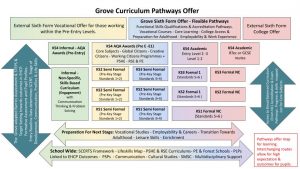Our Curriculum vision aims to emded our vision to make a difference and change lives for the better.
We aim to do this though our principles to Inspire Excellence, Challenge Potential and Empower Learning by ensuring the whole need of each child is met through a comprehensive programme that addresses their academic learning whilst also supporting those difficulties that arise from their autistic spectrum diagnosis.

Our school curriculum is person centered and tailored to the needs of our autistic learners. The curriculum offers pathways for students to learn from personalised programmes that address the needs and difficulties as outlined within the DSM-5. The DSM-5 identifies these areas as;
- a) Difficulties with social communication and interaction and;
- b) Restricted, repetitive patterns of behaviour, interests or activities (sensory behaviours are now included and recognised within this).
At The Grove we aim to realize our school vision through our curriculum by supporting our students to:
- Manage their autism through access to tailored programmes and therapeutic support;
- Have access to a wide curriculum taught in an accessible format
- Have access to practical experiences that build on particular interests, abilities and enjoyment
- Acquire key literacy and numeracy knowledge and skills that are meaningful,
- Achieve external and accredited qualifications that match each student’s’ potential.
- Acquire independence skills to become successful members of the community and prepare them for transition into adulthood
Our aims will be achieved through the delivery of a broad and balanced curriculum
that is:
- Highly personalised and tailored to meet individual needs
- Flexible and responsive to need
- Differentiated and language rich to support communication
- Age and needs appropriate
- Within the framework of the National Curriculum, appropriate for each student
- Focused on providing learning for life and independence skills
- Designed to provide qualifications and meaningful experiences for the world of work
- Supported through the integration and collaboration of a multidisciplinary team
- Centered on personal learning programmes (PLP) that are linked to EHCP outcomes
- Culture rich which includes the promotion of key British Values
Organisation
The school curriculum is designed to meet the educational needs of the students at the school, this includes the difficulties that arise from their autism. This means that learning has to be practical, active and relevant to each student’s capacity and level of need. Our students learn through practical experiences, through consistent and structured teaching and learning situations with opportunities to generalise skills learnt.
The curriculum is organised into different pathways (see Fig 1);
- The Engagement Curriculum
- The Semi-Formal Pathway 1
- The Semi-Formal Pathway 2
- Formal Curriculum Pathway 3
- Formal Curriculum Pathway 4
Students follow whichever pathway is appropriate for their need and level of attainment. Some students may work flexibly between two pathways.

|
Engagement Curriculum |
Semi-Formal Curriculum | Formal Curriculum | |||
| Pathway 1
Pre-Key Stage Standards 1 & 2 |
Pathway 2
Pre-Key Stage Standards 3 & 4 |
Pathway 3
Pre-Key Stage Standards 5 & 6 (National Curriculum KS1) |
Pathway 4
National Curriculum KS2 |
Pathway 4 National Curriculum KS3 & KS4 |
|
| The engagement curriculum is delivered through a combination of relevant content and active learning approaches that promote pupil motivation and participation. It includes hands-on activities and helps pupils connect lessons to their own interests. | The semi-formal curriculum is delivered through distinct subject-specific lessons alongside the formal curriculum. This approach focuses on developing key skills in areas such as communication and interaction, cognition and learning, social and emotional development, and sensory/physical needs. By teaching separate lessons, the school maintains the integrity of each subject and ensures that pupils make clear progress within each discipline. | The formal curriculum provides a structured framework for both knowledge and skills development. Pupils follow the National Curriculum, which is carefully adapted to meet their individual needs. This curriculum is delivered through subject-specific lessons, ensuring a comprehensive and tailored learning experience. | At Key Stage 3, students follow the National Curriculum across core subjects, with adaptations made to meet their individual needs. At Key Stage 4, students follow one of two pathways based on their working level: either working towards Entry Level qualifications or GCSEs, ensuring that each student is supported to achieve the best possible outcomes. | ||
|
Features of The Grove Semi-Formal Curriculum |
Features of The Grove Formal Curriculum |
||||
Semi-Formal curriculum includes:
|
Formal curriculum includes:
|
||||
|
Cycles |
|||||
|
|
|
|||
The Engagement Curriculum
A very small percentage of our pupils are working within the engagement curriculum. Many are within the primary department and often move quickly to our semi-formal curriculum.
The engagement curriculum is a broad non-subject curriculum which aims to develop early skills and knowledge in the following areas;
- Communication
- Play and Leisure
- Thinking and Problem Solving
- Independence
- PSHE
Emphasis is preparing the child for subject specific teaching in the semi-formal pathways.
The semi-formal curriculum is delivered through subject-specific lessons, providing students with a variety of experiences and exposures to learning.
The key areas of Engagement that we focus on are;
- Exploration
- Realisation
- Anticipation
- Persistence
- Initiation
Target setting will be derived from the child’s EHCP and broken down as individual targets on their Personalised Learning Plan (PLP). Formative assessment throughout the term informs the termly PLP updates and review.
The Semi-Formal Curriculum
The semi-formal curriculum provides a framework to develop key skills that are related to the difficulties typically faced by our autistic learners and the areas of learning that are not naturally assimilated in the same way a neurotypical peer may do so.
It is our belief that these areas are fundamental to a child’s development and their readiness for further learning. Once a child has reached a stage whereby they understand communicative intent and are able to communicate their needs, preferences and choices with a partner or partners to a degree whereby they can access learning, they can then progress towards a more formal curriculum and style of learning.
The semi-formal curriculum is delivered through subject-specific lessons alongside the formal curriculum, with an emphasis on developing key skills in:
- communication
- social Communication and emotional regulation through the identification of key transactional supports (SCERTS)
- development of play and leisure skills
- development of thinking and problem solving skills
- development of independence skills to include functional and life skills.
- development of the essential prerequisite skills required to access the National Curriculum framework, including EYFS
The Formal Curriculum
The formal curriculum is delivered through subject-specific lessons, tailored to the age range and ability of the students.
Programmes of study are based on the National Curriculum and adapted where appropriate. Aspects of the semi-formal curriculum are embedded within the formal curriculum to support and develop learning in areas that are recognised as key challenges for our autistic learners. Particular reference is on the SCERTS® framework and the life skills curriculum.
Modern Foreign Languages/Cultural Studies
MFL/Cultural Studies does not form part of the taught curriculum for all pupils. The delivery of the MFL curriculum has been designed to meet the needs of the pupils and their developmental stages of learning. You can read more about MFL and Cultural Studies at The Grove here Statement for Modern Foreign Languages at The Grove
Life Skills & Independence Towards Adulthood
We aim for all our students to develop functional skills for living so each of them is able to lead a fulfilling and substantially independent life. We recognise that for young people with autism every experience may provide a learning experience. Our approach to teaching functional skills and life skills is at the core of our curriculum where our framework can be taught within the programmes of study and the schemes of work. You can read the Grove Essential Life skills Intent here The Grove Life Skills Intent
Input from the speech and language therapist, occupational therapist and other professionals supports the delivery of the life skills curriculum through personal programmes. Areas such as functional life skills and communication are very weighted towards support from therapists.
The life skills curriculum provides a broad framework for each pupil. The pathways will be determined by:
- outcomes on their EHCP
- strengths and areas of development
- individual needs which have been assessed by the parents, staff, therapists, professionals and where possible, the student
Our curriculum includes ample opportunity to develop life skills through the experience of daily activities both on and off site. Furthermore, there is a key focus to each topic or area taught and these are integrated across the day in addition to discrete sessions. There is a strong emphasis on working in partnership with families to ensure the teaching of life skills span across the student’s day including before and after school. The AET progression framework has been adapted to provide a framework for measuring progress within each area of learning.
There are six units of work within the curriculum that include; 1. My social self, 2. My Personal Care & Health, 3.My Safety, 4. My Play & Leisure Time, 5. My Independence, 6. My Travelling. You can read the full overview here: The Grove Life Skills Intent
More information about our taught curriculum can be found under the Learning Tab
- Curriculum
- KS1 & KS2 Curriculum
- KS3 & KS4 Curriculum
- Secondary East Curriculum
- Post 16 Curriculum
- Personal Development
More Curriculum information can be found under our Approach Tab
- Enrichment Curriculum & Residential Trips
- Careers
- Life Skills
- Therapy
If you would like to know more about the school’s curriculum, you can contact us directly using the information on the ‘contact us’ tab or by clicking here.
Educational Health Care Plans (EHCP)
Every pupil who attends The Grove will have an Education Health Care Plan (EHCP). The EHCP is reviewed annually through a Person Centred Annual Review. Parents and the pupils are a vital part of this discussion and reflection on progress.
Pupil’s personal targets are derived from the EHCP targets. This forms the Personalised Learning Plan (PLP) which identifies the small incremental steps and the support required to secure progress towards the outcomes in the EHCP.
Parents and carers are invited 3 times a year to the Pupil Progress Meetings to agree the short term targets in the PLP and review progress.
Progress towards the EHCP outcomes are addressed through the different aspects of the school’s curriculum with a focus on the specific school wide approaches as outlined below.
| Cognition & Learning |
|
| Communication & Interaction |
|
| Social, Emotional & Mental Health |
|
| Physical & Sensory |
|
| Self Help & Independence |
|
Personalised Support Plans
The school writes each pupil a detailed Personalised Support Plan (PSP) which details the resources and strategies that the school and staff will adopt in order to support the child’s outcomes.
The PSP is made up of detailed sections that include;
- Pupil’s Pen Portrait
- Pupil’s Well-being Plan (including support for mental health)
- Pupil’s Transition towards Adulthood Plan (from year 9+)
PSPs are written in consultation with the school based multi-disciplinary teams and the pastoral team.
Further Information about our Curriculum
If you would like further information about our school curriculum you can contact our Curriculum Lead: Lee Mills, Assistant Headteacher: [email protected]


